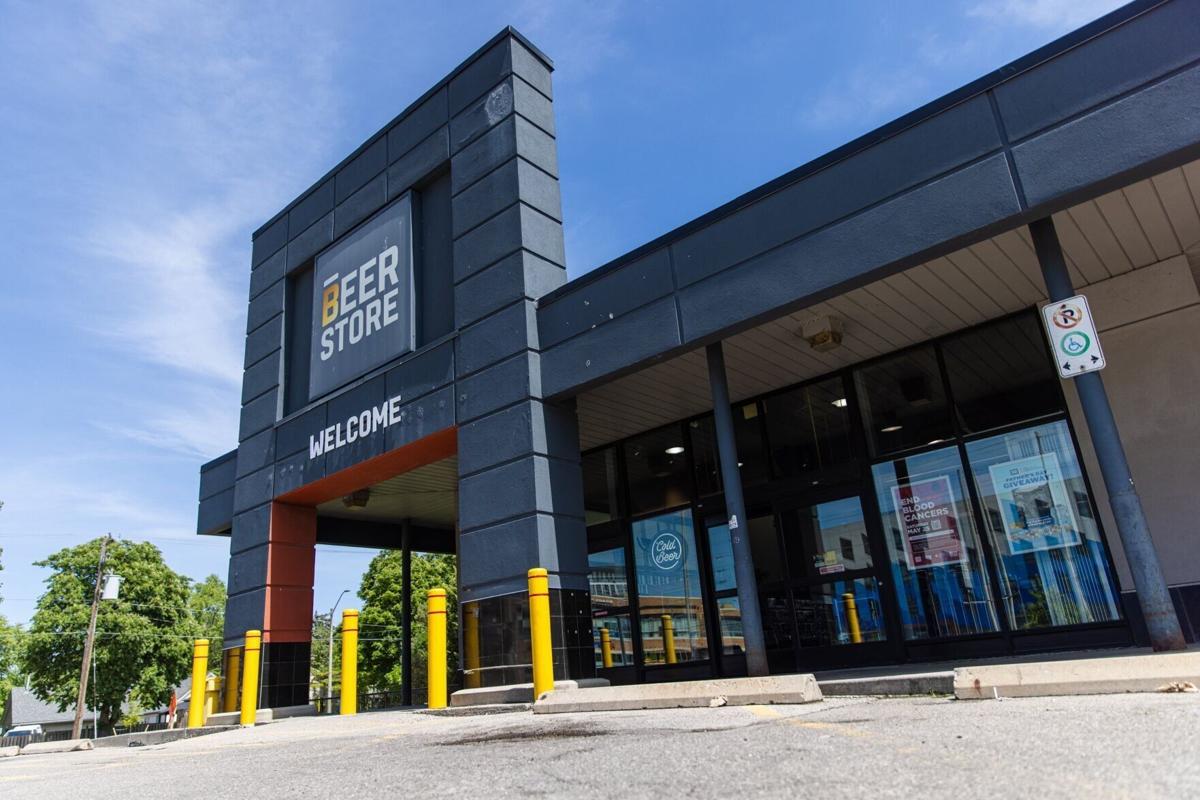Ontario Beer Store (OBS)
A well-known inventory game in the Ontario Beverage Sector has been holding alcoholic beverages for decades. By April 27, 2025, the Ontario beer store will reach the end of the era for both loyal customers and employees who have worked there. This closure is not only important to the people of London but also to the broader context of Ontario’s alcoholic alcohol. This is further developed in response to consumer requirements, legislative reforms, and growing competition from other retailers. The impact of this decision goes beyond merely closing down businesses. It affects the issue of the enduring challenges of public order, consumer behavior, the development of the alcohol trade, and long-term institutions as the world around them. His historical role in the retail sales of alcohol in Ontario. The business was founded as a Brauer cooperative and for many years was the only official beer from Ontario Beer.
His monopoly position took up much of the 20th century, giving the Ontario Beer business a command position in the market. The opening of the Spirits Transaction and the alcohol trading with a broader framework for alcohol sales in Ontario, and the Ontario beer business remained a key unit. In many Ontarians, especially cities such as London, Ontario, beer shops were a familiar part of the shopping experience. With locations throughout the state, it became synonymous with beer buying, providing a reliable retail business for consumers who are aiming to make both a mainstream and craft beer selection. A variety of factors have contributed to the market change, including growth in online and grocery stores, expanding craft breweries, and consumer demand for more convenient retail options Trend. As part of a larger and continuous transformation of alcohol sales in Ontario, the decision relates to postponement of consumer behavior, changes in regulations, and financial considerations.
Given the growing popularity of craft breweries and other retailers serving Alcohol:
More consumers will choose comfort and diversity for the traditional experience of special alcohol dealers. These businesses can reduce the need for consumers to drink beer in addition to weekly foods and visit special alcohol traders such as the Ontario Beer Stores. This change in consumer behavior has led to sales in some locations at Ontario Beer Stores. In an age of rapid innovation, businesses must adapt to changes in consumer habits, and in this case, the Ontario beer business tried to maintain the same association that once existed in the alcohol-retail landscape of Ontario. Class locations such as downtown London can initially be expensive, and if sales of beer businesses in Ontario decrease, financial settlements for physical business maintenance are becoming increasingly difficult.
Shop rental agreements can expire or become affordable, making it financially impossible to continue with the company. The cost of maintaining retail stores at Prime City Centres has increased in recent years, and businesses must make difficult decisions about whether to remain open to other more profitable companies or focus on them. Faced with the reality of a changing retail environment, the Ontario Beer Store has decided to close this particular location as part of a broader strategy. The Ontario government is taking steps to lead alcohol traders, including selling beer, wine, and cider at grocery stores and alcohol at convenience stores. These regulatory changes have intensified competition between the Ontario beer trade and pressured them to rethink their business model.
The development of alcohol sales, particularly government processes and liberalization of retail laws, which increase alcohol accessibility, means that traditional retailers, such as the Ontario Beer business, need to adapt or pose the risk of becoming obsolete. The closure of a London location, one of the state’s large urban areas, could be a strategic step to concentrate on other more profitable regions, or even more developed online and hybrid personal trade models. The closures affect consumers who appreciate the products they offer, and the familiarity and trust that the business has built over the years. Other retailers, including grocery stores and craft breweries, offer alternatives, but many customers can be a loss of a trustworthy institution.
Also Read This: “Performing for an Audience of One: Three Opinion Writers on Kennedy’s Confirmation Hearing“
Closures may not be annoying to all consumers:
Those accustomed to the convenience of online shopping and the new availability of alcohol in grocery stores may notice that shopping habits have already changed. For these consumers, the closure of the beer business in Ontario can feel like a natural development in the retail industry, but there is no doubt a nostalgic feel to the popular local establishment. Whether they work as a cashier, podium, or manager, employees in London locations face the challenge of finding new employment opportunities in an increasingly competitive job market. While Ontario Beer Stores have employed many people over the years, changing types of alcohol trade have made decisions that are difficult for the company. Loss of employment within the retail sector, particularly in professional businesses such as the Ontario Beer business, contributes to the uncertainty that workers feel in the developing landscape of retail employment. This section examines the wider impact of the closure and signals the future of the state’s alcohol trade.
The market is becoming more and more competitive with the introduction of beer, wine, and cider sales at grocery stores, the expansion of alcohol supply services, and online ordering. Traditional branches such as Ontario Beer Stores face new challenges in maintaining their position in the market. As convenience is the driving force behind consumer decisions, companies such as Ontario Beer Stores must adapt their offers to developing expectations. Artisanship across Ontario is booming, offering unique, locally produced products that attract a loyal customer base. Many Ontarians turn to these smaller, more specialized retailers for beer, further reducing the market share of larger, more traditional branches. This competitive pressure forces how retailers, such as the Ontario Beer business, work and serve customers. Given changing regulations, increasing competition, and developing consumer preferences.
Ontario’s beer business must continue to adapt to survive:
Other locations across Ontario could also be closed if the company conforms to its retail strategy and focuses on more profitable regions or formats. In the long term, Ontario’s beer business can include hybrid models, such as a hybrid model focused on online retailing and an expanded partnership with craft breweries. The closure reflects wider industry trends and changing consumer behavior but also highlights the challenge of traditional alcohol dealers in a rapidly changing market. While the retail industry is developing, Ontario’s beer business must continue to adapt to stay relevant and competitive. For Londoners and employees who worked in the shop, the closure is a bittersweet moment marking the end of a long-term facility, but it also provides insight into the future of Ontario alcohol.
Bitty sweet closure of Beer Business in London’s Ontario:
Reflections on the changes and future of the single trade landscape of Ontario alcohol. For many Londoners, beer shops in Ontario were not only retail but also a long-term institution of everyday life. It was a familiar place to pick up beer and offer a wide range of products ranging from domestic beers to international brands. For decades, the business has been a reliable source of drinks and has become part of the social structure of London, Ontario. After years of service, the closure of this place is the end of the era of the cities and communities she visited. Many employees have come to understand the community and become familiar faces to patrons for years, if not decades, in the same place. The closure is undoubtedly an emotional moment for these workers who have contributed to business success over the years.
As they stand up to reality to find new job opportunities in increasingly competitive and rapidly changing retail markets, the closure is reminiscent of the volatility facing today’s economic environment in businesses, particularly retail. The change in the province’s alcohol sales landscape has had a major impact on businesses such as Ontario Beer Stores, and the closure reflects a wider trend.
In recent years, Ontario’s alcoholic individual trading system has developed dramatically. allowing some convenience stores and other retailers to sell alcohol, causing competition for traditional retailers such as the Ontario Beer business. With the rise of craft beer culture, many Ontarians used small, independent breweries to buy beer.
The rise in trend towards online purchasing and alcohol supply services has further disrupted traditional mortar retail models. Many customers are now preferring simple orders of alcohol from the home when delivered directly to the front door. This changing market dynamic has made it increasingly difficult to maintain traditional alcoholism, especially in areas where competition has become violent from other branches.
Conclusion:
The closure of the Ontario Beer Store location in London on April 27, 2025, marks a bitter moment for the community and employees. For Londoners, Ontario Beer Shops have long been a familiar part of the city’s retail industry, offering comfort, diversity, and a sense of tradition. For many, it was the insistence of getting your favorite beer, whether it was an informal night at home or a special occasion. The business was more than just retail. It was a staple in the community and a familiar name that many trusted with alcohol purchases. Closures mark the end of the era, especially for those who rely on it as a regular part of their shopping routine. Many of them were not only dedicated workers but also members of the community. Closures mean unemployment, and with the challenges facing the retail industry, it may not be easy to find comparable employment opportunities. For those who have spent years in business, closures are personal losses and not just their work, but also connections with the company that has long been a part of their lives.
For some, it is an opportunity to explore new opportunities, while for others it is a difficult transition that reflects the greater change in Ontario’s alcohol in the deployment environment. The developing consumer situation has made it increasingly difficult to maintain the competitiveness of traditional models such as the Ontario Beer business and increased online purchases. The growing popularity of craft breweries, deregulation of alcohol sales, including grocery stores, and an increase in alcohol supply services reflect more frequent trends in the market. These changes will encourage established companies, such as the Ontario Beer Store, to rethink their business strategies and adapt to new consumer behavior.
While the state government has loosened regulations on alcohol sales and consumer preferences will develop, the role of traditional alcohol traders will likely continue to decline. Ontario’s alcohol market is a more diverse and more competitive future dominated by comfort, variety, and new retail formats. It is an emotional moment for both London and its employees to mark the end of a long-standing facility, but it also provides insight into the future of Ontario alcohol.




